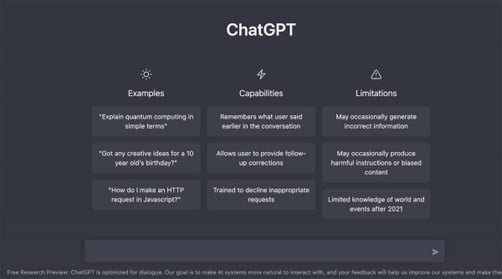Ethics, Science and Technology
Context:
- In 2022, OpenAI opened its most recent and powerful AI chatbot, ChatGPT, to test its capability.
- It amazed netizens across the world by answering questions, fixing broken code, etc.
- Some users have been testing the bot’s capability to do nefarious things – Illicit actors have tried to bypass the tool’s safeguards and write malicious code.
ChatGPT:

- ChatGPT is a ‘conversational’ AI based on OpenAI’s GPT 3.5 series of language learning models (LLM).
- This is a kind of computer language model that relies on deep learning techniques to produce human-like text based on inputs.
- It has gone viral is because of the kind of responses it gives, being seen as a replacement for much of the daily mundane writing, from an email to even college-style essays.
- The model is trained to predict what will come next, and that’s why one can technically have a ‘conversation’ with ChatGPT.
- It is trained using “Reinforcement Learning from Human Feedback (RLHF).”
- OpenAI uses Microsoft Azure’s cloud infrastructure to run these models.
- Users have the option of downvoting or upvoting a response.
Applications:
- It will answer queries just like a human would.
- Such as tips on how to set up a birthday party, write an essay on why parliamentary democracy is better, and even a fictional meeting between two well-known personalities.
- It can answer follow-up questions and can also admit its mistakes, challenge incorrect premises, and reject inappropriate requests.
- It is being seen as a replacement for the basic emails, party planning lists, CVs, and even college essays and homework.
- It can also be used to write code, solve math equations, and even spot errors in code.
- It can write fiction but not at the level of a human.
Ethical Challenges:
- Biased content – Since in case of machine learning, artificial intelligence is developed based on input of information, incorrect or biased information can create “biased” content
- The chatbot displayed clear racial and sexist biases
- Lack of objectivity – Its knowledge of the world and events after 2021 is limited and may give inaccurate results.
- Lack of authenticity- It could give “plausible-sounding but incorrect or nonsensical” data that raises issues of credibility such as it can sometimes overuse certain phrases
- Lack of relevance – Although the chatbot gives grammatically correct answers, these lack context and substance.
- Write Malware– ChatGPT is programmed to block obvious requests to write malicious Code for amateur coders looking to build malware.
- However, the more seasoned ones could trick the bot into correcting or enhancing malicious code they have partially developed.
- They could get through the system by phrasing their request in an innocuous way.
- Phishing emails – OpenAI notes that asking its bot for illegal or phishing content may violate its content policy. But for someone trespassing such policies, the bot provides a starting point.
- Cybersecurity firm Check Point’s researchers tested the bot by asking it to draft a phishing email for a fictional webhosting firm – ChatGPT gave an impressive ‘phishing email’ in reply.
- The response section included a warning that read: “This content may violate our content policy. If you believe this to be in error, please submit your feedback – your input will aid our research in this area.”
- Plagiarism chokepoint
- In education sphere, the bot could be used to turn in plagiarised essays that could be hard to detect for time-pressed invigilators since GPT models write in a statistically vanilla way.
- New York City’s education department banned ChatGPT in its public schools.
- Privacy and security concerns – Large language models (LLM) can be easily automated to launch complicated attack processes to generate other malicious artifacts.
- Inherently buggy code
- Stack Overflow, a forum for software programmers, banned its users from using any AI-generated code on the platform.
Suggestions for future:
- Provide a universal framework of values, principles and actions to guide States in the formulation of their legislation, policies or other instruments regarding AI, consistent with international law.
- Protect, promote and respect human rights and fundamental freedoms, human dignity and equality, including gender equality; to safeguard the interests of present and future generations; to preserve the environment, biodiversity and ecosystems; and to respect cultural diversity in all stages of the AI system life cycle
- Promote equitable access to developments and knowledge in the field of AI and the sharing of benefits, with particular attention to the needs and contributions of LMICs, including LDCs, LLDCs and SIDS
- In education sphere – where the answers coming from a human and ChatGPT are in a similar zone, a different kind of pedagogy could help such as looking beyond summarisation and reporting based on what is available on the Internet can help.
- Proportionality and Do No Harm – none of the processes related to the AI system life cycle shall exceed what is necessary to achieve legitimate aims
- Right to Privacy, and Data Protection – Data for AI systems be collected, used, shared, archived and deleted in ways that are consistent with international law and in line with the values and principles
- Human oversight and determination – it is always possible to attribute ethical and legal responsibility for any stage of the life cycle of AI systems to physical persons or to existing legal entities.
- Human oversight refers thus not only to individual human oversight, but to inclusive public oversight
Way forward
- National and international governmental and non-governmental organizations, as well as transnational corporations and scientific organizations must collaborate to generate universal ethical values for AI.
- In education sphere, helping educators think through the different types of prompts to best assess students to help them stay away from using ChatGPT is important
Source DTE













